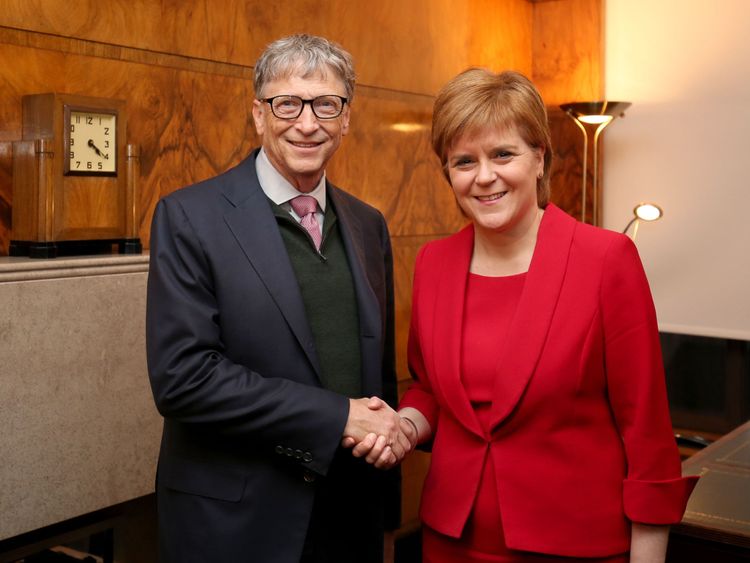The UK has joined forces with billionaire businessman Bill Gates to help bring farmers closer to producing "supercrops", higher-yielding dairy cows and chickens which lay better quality eggs.
They announced funding for the innovative agricultural projects in Scotland on Friday.
Researchers' work could lead to crops that can withstand droughts and disease and cows that can produce more milk.
The Department for International Development and the Bill and Melinda Gates Foundation have invested £122.8m into the projects, which could help farmers around the world.
"If you care about the poor, you should care about agriculture," Gates said in an address at the University of Edinburgh.
"And if you care about agriculture, you care about livestock. What that means in this context is helping poor farmers get as much as possible out of their animals."
The Microsoft founder emphasised the importance of healthy livestock as a source of nutrition and money.
Mr Gates' foundation will invest £28.2m into projects aimed at developing vaccines for animals which are accessible to poorer, small-scale farmers across the continent of Africa and South Asia through the Edinburgh-based charity Global Alliance for Livestock Veterinary Medicines.

Britain's international development minister Penny Mordaunt hailed the move.
She said: "We think that the result of this investment will help 100 million African farmers, but also give a payback to UK farmers as well, as disease doesn't stop at borders."
According to the International Livestock Research Institute, up to 750 million people in low and middle income countries depend on livestock farming.
The UK will also support global research body CGIAR with funding of £90m over three years to deliver new farm technologies.
More from Tech
Another £4m will be pumped into the Centre for Tropical Livestock Genetics and Health, which is a joint venture based in Edinburgh and Nairobi.
It aims to improve the productivity and health of livestock in sub-Saharan Africa by making use of the latest genetic technologies.
The UK has joined forces with billionaire businessman Bill Gates to help bring farmers closer to producing "supercrops", higher-yielding dairy cows and chickens which lay better quality eggs.
They announced funding for the innovative agricultural projects in Scotland on Friday.
Researchers' work could lead to crops that can withstand droughts and disease and cows that can produce more milk.
The Department for International Development and the Bill and Melinda Gates Foundation have invested £122.8m into the projects, which could help farmers around the world.
"If you care about the poor, you should care about agriculture," Gates said in an address at the University of Edinburgh.
"And if you care about agriculture, you care about livestock. What that means in this context is helping poor farmers get as much as possible out of their animals."
The Microsoft founder emphasised the importance of healthy livestock as a source of nutrition and money.
Mr Gates' foundation will invest £28.2m into projects aimed at developing vaccines for animals which are accessible to poorer, small-scale farmers across the continent of Africa and South Asia through the Edinburgh-based charity Global Alliance for Livestock Veterinary Medicines.

Britain's international development minister Penny Mordaunt hailed the move.
She said: "We think that the result of this investment will help 100 million African farmers, but also give a payback to UK farmers as well, as disease doesn't stop at borders."
According to the International Livestock Research Institute, up to 750 million people in low and middle income countries depend on livestock farming.
The UK will also support global research body CGIAR with funding of £90m over three years to deliver new farm technologies.
More from Tech
Another £4m will be pumped into the Centre for Tropical Livestock Genetics and Health, which is a joint venture based in Edinburgh and Nairobi.
It aims to improve the productivity and health of livestock in sub-Saharan Africa by making use of the latest genetic technologies.











